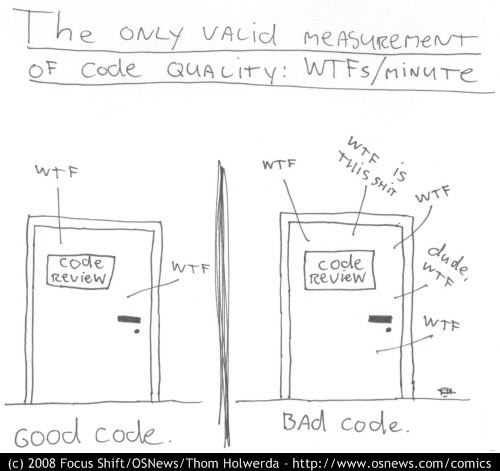What would be the main attributes of good code?
For further actions, you may consider blocking this person and/or reporting abuse
What would be the main attributes of good code?
For further actions, you may consider blocking this person and/or reporting abuse
Top comments (58)
There's a really great chapter about this in "Game Programming Patterns" by Robert Nystrom:
Be sure to read the whole thing!
I like this a lot. "Accommodation to changes" accounts for readability, organization, testing, and a lot of other things bundled in.
Coding only for the problem at hand right now: Bad.
Coding for every possible future need: Bad.
Coding to solve current problems while being accommodating towards future modifications: Good.
I have seen this scenario a few times and it obviously delays the whole project because requirements keep changing and so does the code.
This. There are few things that I feel like are as satisfying as being like "Oh crap, I need to make sure it can handle ABC" or "I need to change it for this new thing" and realizing you wrote it such that sure, it does need to change somewhere, but it has that capability for change without things getting messy. The opposite of having to add more and more logic to handle cases.
A few points taken from Robert Nystrom are:
High quality code is the one that has a low wtf/hour ratio
😅
This is the one and only true metric for good code quality. It never fails.
Exactly so, although I think that per minute would be a really big number hahaha.
An interesting point from Gridshore on this:
Definition:
Attributes:
It's like art vs obscenity; I know it when I see it.
So, what would be the optimal time? Or is it somehow subjective depending on the circumstances?
It's subjective and variable depending on the circumstances:
There's an implicit assumption that you can't spend "forever" on a piece of code; at some point it's got to be "good enough" so you can move on. It's also subject to diminishing returns.
To me, high quality code means less lines of code, but has more power. That power might be a useful abstraction, or it's just a useful algorithm to solve repeatable problems.
And if you want more quality of your code, make it easy to test, the easier to test a code block, the more quality that code block has.
And if you want even more quality of your code, make it fast. If your language couldn't make it fast enough, change the language.
How can you make your code faster?
"Make it fast" means you should use better algorithms or data structures to solve the problem. Because as you know, to solve one problem, there're many ways to do it. So it's also called optimization of the code to use better libraries, for example.
Personally, the more that code reads like prose, the higher quality it is. High quality code tells you the story about the business solution that it is implementing.
My favorite code is that which reveals to me something about the business that I did not previously know. Plus, like businesses, it’s written in a way to accommodate the future only when the future arrives.
Maintainable and efficient.
Maintainable means it is easy to understand, sensibly organized, it is painless to make modifications that should be expected (client wants to add another type of report), and as easy as possible to make changes that aren't (client wants a totally new feature)
Efficient means the code uses as few resources as possible to accomplish its job, so that it is as fast and scalable as possible.
Uncle Bob says:
That is good advice for a beginner!
I'm going to use the #likeimfive approach here.
If code is like cake, then good code is like cake that you can enjoy eating and that will not leave you with stomach aches later on.
Note that 'doing what it is supposed to' is not an attribute of good code any more than 'being edible' is an attribute of good cake. That's just a fundamental real-world requirement for when someone asks you to write code / bake a cake. It doesn't have anything to do with either of those being good.
Just to highlight.. so you mean cake is considered good based on the experience of eating it.
In the case of cake, yes. How that translates to code is that code is also experienced as being good by how you interact with it later, i.e. modifying it in any way (rather than just looking at it).
I’ll chime in with some characteristics I try to impart to my code:
My personal definition is very subjective: A code is of high quality if
Some comments may only be visible to logged-in visitors. Sign in to view all comments.